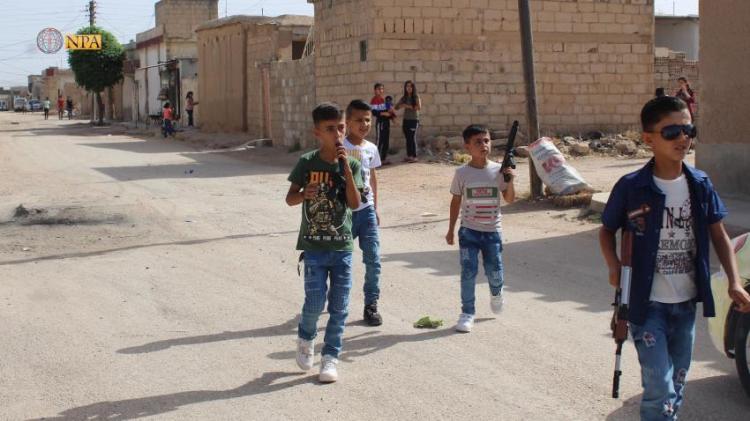Acquisition of toy weapons by children in Qamishli
Qamishli—North-Press Agency
Ibrahim Ibrahimi
As Syrian war has a negative impact on the country on all levels, children are the most affected category, where they walk in streets holding plastic weapons instead of candy and toys, in a scene similar to gunmen in war and real fighting. This phenomenon has been particularly increased this year during Eid al-Adha in the city of Qamishli.
Each year, particularly at Eid time, plastic weapons are the most common toys which are seen in the hands of children, while it has much grown in this year’s Eid.
Psychological consequences
Obviously enough, this phenomenon reflects the general situation that the region is suffering, as psychologists indicate that the psychological state of children is massively affected by war.
Muhammad Othman, the director of Smart Center for Psychological Consultations has told North-Press that the overall environment of the streets, media, friends and families encourage the children to play and buy violent toys, which in turn affects their behavior, and increases their violence and cruelty in dealing with others, while weakens the human side of kindness and compassion inside them.
Aggressive behavior
Moreover, the continuing impact of playing with toy weapons on the child’s psychology raise concerns of social workers.
“We noted that the phenomenon of weapons’ games has widely spread among children, which has generated all of this aggressive behavior inside them, as well as the culture of vengeance as they grow up, and destructive ideas towards the society,” said the social consultant Jihan Ali to North-Press.
Jihan Ali advises to treat the children who carry toy weapons, pointing out that it’s “the task of family, supervisors and schools.”
“Weapons’ games generate a great psychological disorders for the children, and it can turn into a state of depression and commitment of crimes in the future,” she added.
High demand
Salah Muhammad, an owner of a toy store in the city of Qamishli, told North-Press that this Eid has witnessed a great turnout for buying plastic weapons, to the extent that children no longer would like to buy other toys, knowing that there are lots of educational and awareness games that could benefit them instead of plastic weapons.
Circulation without implementation
Furthermore, plastic weapons cause serious injuries to children, especially in their eyes, if they are shot towards the face, which prompted the responsible authorities last year to prevent the import and sale of toy weapons.
After repeated incidents last year, mostly in the western neighborhoods of Qamishli, amid frequent criticism regarding this phenomenon on social media, the Directorate General of Commerce in al-Jazira region had issued a circular last year, through which it had prohibited the import of toy weapons.
The reasons of the circular go back to children’s acquisition of “negative behavior” as a result of war conditions in the country, yet toy weapons are still being sold in the shops, and children still play with them.

